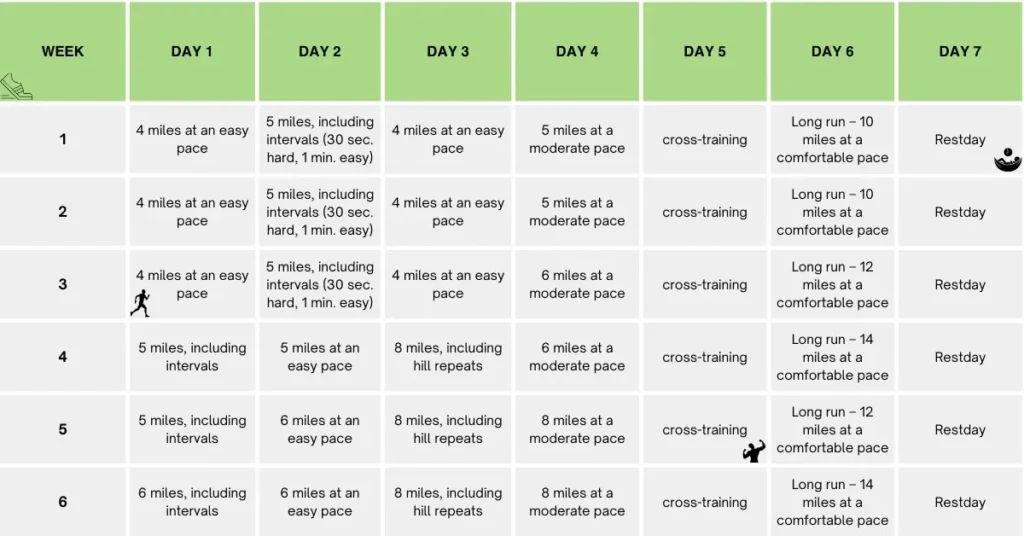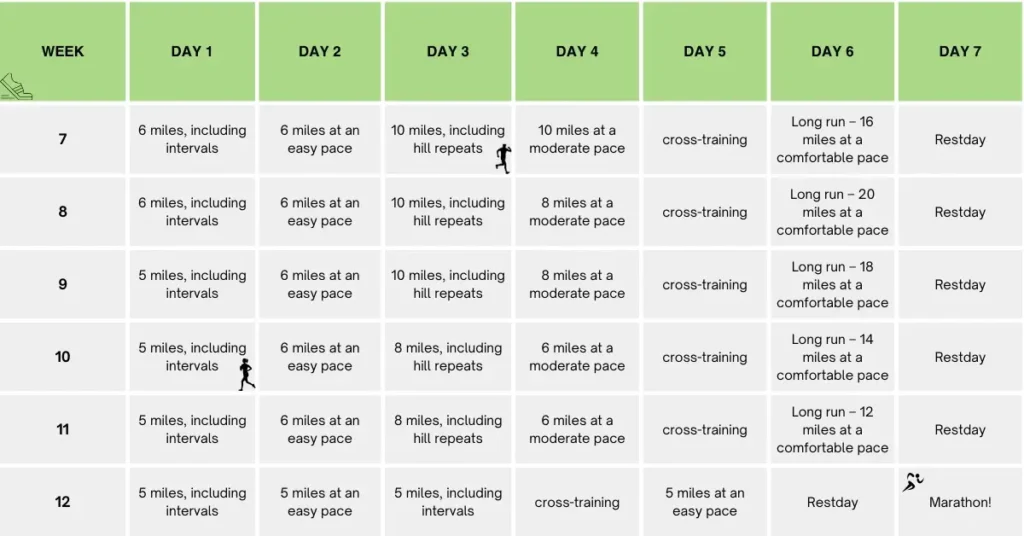When it comes to running a marathon, preparation is key. A 12 week marathon training plan can help you get ready for the big day. Whether you’re a beginner or an intermediate runner, a well-designed training plan can help you build endurance, improve your speed, and prevent injury.
A good marathon training plan should include a mix of regular training runs, long slow runs, cross-training, and rest days. It should also take into account your current fitness level and your specific goals for the race.
For example, if you’re aiming for a specific finishing time, your plan should include workouts that focus on speed and tempo runs. On the other hand, if your goal is simply to complete the distance, your plan should focus on building endurance and gradually increasing your mileage.
There are many different 12 week marathon training plans available online, each with its own unique approach. Some plans are designed specifically for beginners, while others are geared towards more experienced runners. No matter which plan you choose, the key is to stick with it and be consistent. With the right training and preparation, you can cross that finish line with confidence and pride.
Pro´s:
- ✅ Very portable
- ✅ High quality
- ✅ Reduce stiffness
Con:
- ❌ Could be a little softer
Your 12 Week Marathon Training Plan: Start Here!
Excellent! So you’ve decided to run a marathon. This is a decision you can be proud of. So that you can get in shape now, we have our 12 week marathon training plan for you!
Here is the first part of our 12 week marathon training plan

And here is part 2 of our 12 week marathon training plan

Below we would like to give you an overview of the individual phases of our 12 week marathon training plan.:
Weeks 1-3: Base Building
Let’s go! In the first three weeks of our 12 week marathon training plan we will take care of your basic fitness.
That means we start slowly and see that we complete our long run on the weekend. Our goal is to increase the distance of your long runs step by step for the many steps in a marathon.
Makes sense, right? After all, you want to run a marathon!
It is always important that your body first has to get used to the strain. Don’t go at it too quickly at the beginning and avoid stupid injuries. I’ve made the same mistake myself and then had to struggle with runner’s knee pretty quickly.
I wish I had already had our 12 week marathon training plan back then.
Weeks 4-6: Increasing Mileage
In the coming weeks, we will work on increasing your weekly running distance. This means you will continue to do your 3-4 units during the week and the long run on the weekend.
However, the distance will increase so that by the end of the week you will have run 30-35 miles.
Weeks 7-9: Speed and Endurance
Week 7-9 of our 12 week marathon training plan focuses on your running speed and endurance!
Important content here is interval training, cross-training, and hill runs. This will take our bodies to the next level. believe me, you will feel indescribably good. simply unstoppable.
Furthermore, the weekly mileage will continue to increase. Most people can’t get anywhere near their asses for the long runs you’re doing now. Respect!
Weeks 10-12: Tapering and Final Preparations

In the final three weeks of training, we’ll start to taper our workouts to allow our bodies to rest and recover before the big day. We’ll reduce our weekly mileage and focus on shorter, easier runs.
Our long runs will decrease in distance as well. During this phase, we’ll also focus on final preparations such as nutrition, hydration, and mental preparation.
By following our 12 week marathon training plan, you’ll be well-prepared to tackle 26.2 miles with confidence and ease.
Always remember, your biggest opponent is yourself! Enjoy the journey!
Nutritional Guidelines
As we prepare for a 12 week marathon training plan, it’s essential to pay attention to our nutritional needs. Proper nutrition can help us perform better, recover faster, and avoid injuries.
In this section, we’ll discuss the nutritional guidelines we should follow during different stages of our marathon training.
Pre-Training Diet
Before we start our training plan, we should focus on building a solid foundation of good nutrition. Our pre-training diet should include a balance of macronutrients (carbohydrates, proteins, and fats) and micronutrients (vitamins and minerals).
Here are some pre-training diet guidelines:
- Eat a variety of fruits and vegetables to get enough vitamins and minerals.
- Consume lean protein sources such as chicken, fish, and tofu.
- Include complex carbohydrates such as whole grains, sweet potatoes, and brown rice.
- Avoid processed foods, sugary drinks, and alcohol.
During Training Diet
During our training, we need to fuel our body for optimal performance and recovery. Our diet should provide us with enough energy to sustain our workouts and help us recover faster.
Here are some during training diet guidelines:
- Consume enough carbohydrates to fuel our workouts. Aim for 3.5 – 4.5 grams of carbohydrates per pound of body weight each day on intense training days.
- Eat enough protein to help us recover faster. Aim for 0.5 – 0.7 grams of protein per pound of body weight each day.
- Include healthy fats such as nuts, seeds, and avocado to provide us with sustained energy.
- Stay hydrated by drinking enough water and electrolyte-rich fluids.

Pre-Race Diet
In the week leading up to our marathon race, we need to focus on our pre-race diet. Our goal is to maximize our glycogen stores, which are our body’s primary fuel source during endurance exercise.
Here are some pre-race diet guidelines:
- Eat a carbohydrate-rich diet in the days leading up to the race. Aim for 3.5 – 4.5 grams of carbohydrates per pound of body weight each day.
- Avoid high-fiber foods and spicy foods that can cause digestive issues.
- Drink enough fluids to stay hydrated.
Post-Race Recovery Diet
After we complete our marathon race, we need to focus on our post-race recovery diet. Our goal is to replenish our glycogen stores, repair our muscle damage, and reduce inflammation.
Here are some post-race recovery diet guidelines:
- Consume enough carbohydrates to replenish our glycogen stores. Aim for 1.2 – 1.5 grams of carbohydrates per pound of body weight in the first 30 minutes after the race.
- Eat enough protein to help us repair our muscle damage. Aim for 0.5 – 0.7 grams of protein per pound of body weight each day.
- Include anti-inflammatory foods such as berries, leafy greens, and omega-3-rich fish to reduce inflammation.
- Stay hydrated by drinking enough water and electrolyte-rich fluids.
Injury Prevention
When training for a marathon, it’s important to take steps to prevent injuries. Here are some things we can do to minimize the risk of getting injured during our 12 week marathon training plan.
Warm Up and Cool Down
Before starting any training session, we should always start with a warm-up routine. This can consist of a light jog, dynamic stretching, or mobility exercises. A proper warm-up helps to increase blood flow to our muscles and prepares them for the workout ahead.
Similarly, we should also cool down after each workout. This can consist of a light jog, static stretching, or foam rolling.
Cross-Training Exercises

Cross-training is an excellent way to reduce the risk of injury during marathon training. It involves doing different types of exercise, such as swimming, cycling, or yoga, to work different muscles and reduce the impact on our joints.
Rest Days
Rest days are just as important as training days. They give our muscles time to recover and repair, and help to prevent overuse injuries. We should aim to have at least one rest day per week, and avoid training on consecutive days.
During rest days, we can engage in light activities such as walking, stretching, or yoga. This helps to promote blood flow to our muscles and aid recovery.
Mental Preparation

Mental preparation is just as important as physical preparation when it comes to running a marathon. Here are some techniques that can help us get mentally ready for the big day.
Goal Setting
Setting goals is an essential part of mental preparation. We need to set realistic goals for ourselves and make sure they are specific, measurable, achievable, relevant, and time-bound. For example, our goal could be to finish the marathon in under 4 hours.
We can break down our goal into smaller, achievable milestones. For instance, we can aim to run 5 kilometers without stopping, then 10 kilometers, and so on. Achieving these milestones will give us a sense of accomplishment and motivate us to keep going.
Visualization Techniques
Visualization is a powerful technique that can help us prepare mentally for the marathon. We can visualize ourselves running the marathon, crossing the finish line, and achieving our goals. Visualization can help us stay focused, calm, and confident during the race.
We can also visualize potential obstacles and how we would overcome them. For example, we can visualize ourselves running up a steep hill and remind ourselves to take shorter strides and maintain our breathing rhythm.
Visualization can be done in various ways. We can create a mental picture of ourselves running the marathon, or we can watch videos of other runners completing the race. We can also use positive affirmations to reinforce our visualization.
Final Week Preparations
In the final week leading up to the marathon, we want to make sure that we are fully prepared and ready to tackle the 26.2 miles ahead. Here are some important things to consider in the days leading up to the race.
Tapering
During the final week of our 12 week marathon training plan, we will be tapering our training to ensure that our bodies are well-rested and ready for race day. This means that we will be reducing our training volume and intensity to help our muscles recover and rebuild before the big day.
It’s important to stick to our tapering plan and resist the urge to overtrain or do any last-minute intense workouts. Trust in the work we’ve put in over the past 12 weeks and give our bodies the rest they need to perform at their best on race day.
Equipment Check: Here is your Checklist!
Before heading to the starting line, we want to make sure that we have all the necessary equipment and gear to help us perform our best on race day. Here’s a checklist of items to consider:
- Running shoes: Make sure they are broken in and comfortable for long-distance running.
- What to wear for a marathon: Check the weather forecast and dress appropriately for the conditions.
- Race bib: Make sure to attach it to our clothing in the correct location.
- Timing chip: Make sure it’s attached to our shoes or bib according to race instructions.
- Fuel: Pack energy gels, chews, or other snacks that we’ve trained with and know work well for us.
- Hydration: Consider bringing a handheld water bottle or hydration pack to stay hydrated throughout the race.
- Watch: Bring a reliable watch to keep track of our pace and time.
Race Day Strategy

Having a solid race day strategy can help us stay focused and motivated throughout the marathon. Here are some tips to consider:
- Pace ourselves: Start off at a comfortable pace and avoid going out too fast.
- Fuel and hydration: Stick to our fueling and hydration plan that we’ve trained with and know works well for us.
- Mental game: Stay positive and focused, and break the race into smaller, manageable chunks to make it feel less daunting.
- Enjoy the experience: Remember to take in the sights and sounds of the race and enjoy the experience of running a marathon.
- Believe in you: and our 12 week marathon training plan
Our Opinion on the 12 Week Marathon Training Plan
Hi guys, first of all we would like to thank you for your trust and interest.
With our 12 week marathon training plan we wanted to appeal to both experienced runners and absolute beginners. I think we managed that well.
Of course, for beginners, the whole thing may seem scary at first, but I firmly believe that our 12 week marathon training plan can also be the right thing for you.
Before you start the 12 week marathon training plan, in my opinion, you should already be able to run 10 miles in a row.
Otherwise, I would recommend a longer preparation phase. Just so that you give your body the time it needs and want to avoid injuries.
If you can already run 10 miles then start with our 12 week marathon training plan. With commitment, discipline, a positive mindset, a goal in mind, and belief in yourself, you will overcome the challenge!
FAQ
Can I prepare for a marathon in 3 months?
While it’s challenging, some with a running base may complete a marathon in 3 months. However, it’s advisable for beginners to extend training for a more gradual buildup, reducing injury risk. Check out our 12 week marathon training plan!
Can I train for a marathon in 2 months?
Training for a marathon in 2 months is highly challenging and not recommended, especially for beginners. Adequate preparation reduces injury risk. Aim for longer training periods for a safer buildup. But I can recommend our 12 week marathon training plan!
Can I train for a half marathon in 12 weeks?
Yes, a 12-week training program is suitable for many with some running experience to prepare for a half marathon. Ensure a gradual increase in mileage, include speed work, and prioritize rest.
We are convinced of our 12 week marathon training plan and would be happy if you are too!
Feel free to let us know in the comments!







